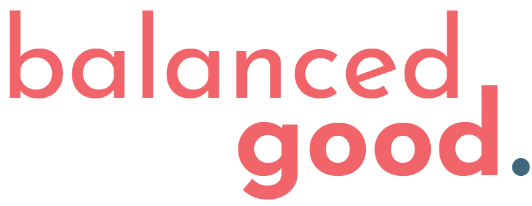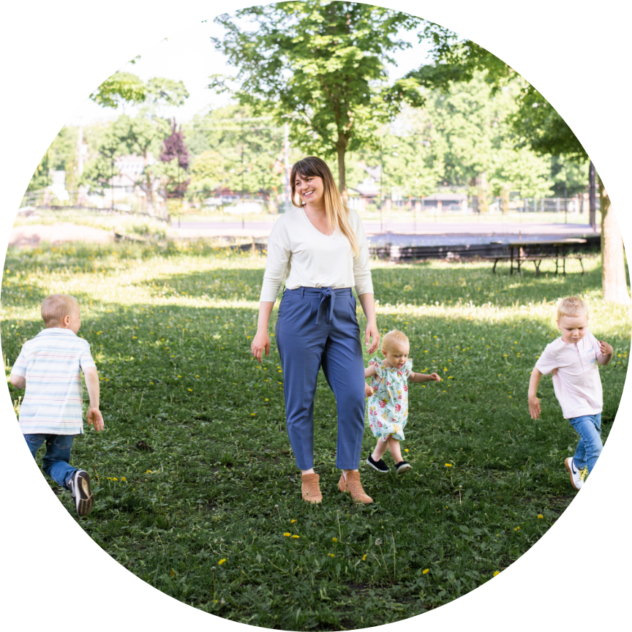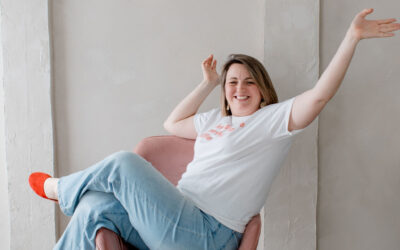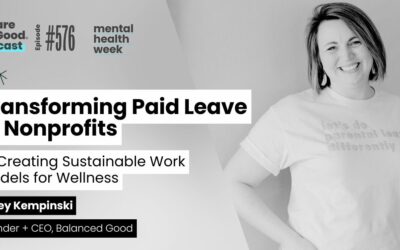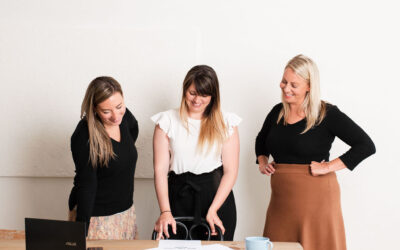What happens when your actions don’t match up to your values? How can you tell if you’re living out your values? How do you begin to identify your values? And how can you live your values out in work?
So many questions leading to fantastic gems from the heart of the incredible Kimberley MacKenzie, CPCC, ACC (she/her).
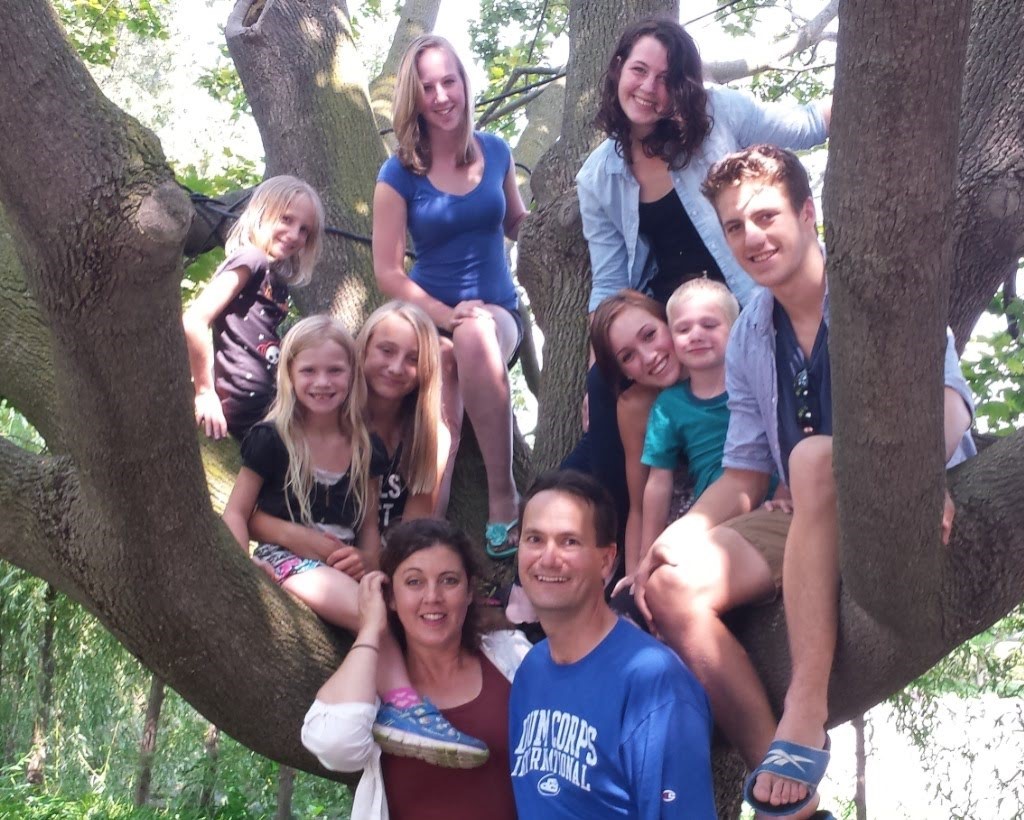
There are ten people and two dogs in our blended family. My husband 2.0 Rob, two biological children Skye 26, Chase 24 and my stepchildren Megan (due to have a baby in April 2023) 25, Erin 22, Taite 20, Aveen 18, Shannon 16 and Scott 14. And two puppies Zoe and Reggie. Our house is very dynamic.
Kimberley is a Certified Professional Co-Active Coach and the CEO and owner of The Intersection which is a virtual support hub helping those working for social good. She also volunteers as the Vice President on the Board of Directors of Ontario Land Trust Alliance. Kimberley has a blended family of 10 humans and 2 puppies with a granddaughter on the way!
During her first pregnancy, Kimberley got involved with La Leche League Canada. LLLC was so formative and important to me when I first became a Mom and supportive not only in my breastfeeding but also for my whole post-partum journey.
In the following conversation, Kimberley gives authentic, heartfelt responses to my various questions about her work with value realignment and life in and outside of the sector. I’m so excited to share these valuable insights with you! Connect with Kimberley in LinkedIn, Instagram, or email.
Briefly tell me about a day in the life of Kimberley MacKenzie.
What I love about my life is how dynamic it is. Depending on the season, the kids and who happens to be at home is never the same.
The wonderful thing about having a global coaching practice is that it is very common for me to have calls in several time zones. My clients are in the United Kingdom, the West Coast, the East Coast, Florida and even The Middle East! The fact that I can work with so many amazing people from all corners of the globe while my puppies cuddle under my desk and soup simmers on the stove is a dream come true.
In the Spring/Summer and Fall I like to get up early and take my dogs for a walk along the trail on the shores of Lake Simcoe. When I get home, a putter through my garden with a cup of coffee gives me unspeakable joy. In the winter, my morning routine is more relaxed, and I often take a bit of an extra snooze. I really value rest. It’s good for the skin!
On a typical weeknight there are six of us at the table – but meals can range from just my husband and I to twelve, sometimes more people. In our house no topic is off limits, and the kids comfortably discuss sex, racial tension, travel, drugs and mental health issues. Bad Dad jokes are a constant even an expectation at this point and long games of “would you rather” are common. In fact, we are now at a point where the teenagers chat with each other, long after they have finished eating. That’s a point of pride for me. It took a lot of work blending our complicated family and dinner is where we reap the rewards. When dinner is finished, I take the dogs out for a “Big Loop, Two Poop” walk while the kids and my husband play music unbearably loud while cleaning up the kitchen.
Being an entrepreneur means that I can easily prioritize the needs of my family. Whether it is a high school football game, midwife appointment or sneaking off to go skiing when the conditions are perfect. I live in a constant balance of between showing up for my business, myself, or my family. It is a privilege I am grateful for every single day.
During your early volunteering with La Leche League, you were very intentional about staying home with your young kids and identified ‘staying home full time’ as one of your values at the time. How did you pin-point your initial values?
This entire post could be filled with my days as a young mother. Yes, LLLC was incredibly influential in all my life decisions. The journey to become an LLLC Leader included an extensive values exercise that really led from the heart.
I think the most critical lesson I learned at La Leche League is that I can have it all – just not all at once. Life comes in seasons and so when I was in the season of being a young mother, I very much saw that as my “job”. When my babies were small it was much easier for me to focus on things, I could do to save money, than working for money outside the home.
My core values of Family First and People Before Things really were put into action. I loved making bread, shopping in thrift shops, doing clothing exchanges with other mothers and spending my time at the park or watching the miracle of ants in the cracks of the sidewalk. For me there was nowhere more important to be and nothing more important to do.
Over time I became more involved with LLLC as a volunteer. I was training other leaders, starting new groups, helping hundreds of young mothers and babies get to know each other and eventually running national fundraising programs.
When I think back in those days (1996-2001) I felt “richer” than I ever have since. I was busier than I ever have been, and my heart was so very full. In fact, the very first conference I spoke at I did so while literally breastfeeding my massive 12-month-old son.
I still get emotional thinking about what that time meant to me, and it was that volunteer work that led me to the Charitable sector. There was no other time in my life when my values were so closely aligned with my actions.
You’ve also been very open with your story from having, to losing, to rediscovering your ‘smile’ – how, in the midst of your story, your value in putting family first had evolved to family gone. How did losing track of your values impact how you structured your coaching practice?
Great question. Thank you.
One of the core philosophies of my practices is to be the kind of coach I wish I had had. When I think back on my career, I wish I had a coach to support me along the way. During all of it. Transitioning to primary income earner, travelling internationally, dealing with misogyny, commuting, getting fired and ultimately divorced – at the same time. Starting a business….it didn’t need to be so hard. A coach would have had a massive impact. I want that for more people now.
Often clients come to me when they are in a state of discord or friction. Values are the very first place I start with my clients. During challenging times or when we are stuck it is often because our values are not aligned with our actions. Our goal is to get that alignment with the intention of achieving a state of resonance. That’s where the smile is – for everyone. I’m so humbled that my clients invite me into that process.
And of course, as I mentioned above. I am afforded the flexibility now of being able to structure work around my life, rather than life around work. My hope is that more people have that opportunity.
One thing I really love about your approach to co-active coaching and work is what I like to call ‘leave your ego at the door’ mentality. How does this mentality play into the value realignment process?
Years ago, when working as a director of fundraising, I realized the key to achieving what you need for success is approaching all situations from a position of service above self.
It’s helpful to ask yourself “how can what I need make another person’s job easier? How can this objective result in more impact for everyone else?” When I was an Executive Director looking at leadership through the lens of ‘helping my staff grow out of their jobs, the result was always a stronger, more stable and loyal team.
When I think back to any point of tension while working inside a charity, I can now clearly see that situation arose because I put my needs at the centre of the issue.
If we can approach out work from a position of “How can my actions have a positive impact on the people I come in contact with?” a.k.a. Service, the path forward becomes much easier, and people very often want to join you on the journey and be part of your success. That’s a win for everyone.
With respect to coaching. Humility is one of the cornerstones of being an effective co-active coach. If I centered myself in a session or pursued an agenda of my own, I would lose the intimacy and safety of the session. If that happens, then the client’s agenda – even if they don’t know exactly what that is – would be lost. That’s part of the magic of co-active. Surrendering to the client’s agenda and dancing in the moment with them. It is always so exciting to see where the session ends up.
With respect to building and standing on a platform for yourself I did wrestle with questions about why am I doing this? Especially when I had my branding photos done. My thoughts were really toxic: Why do I want to put myself out there? Will people laugh at me? What if people don’t like it? When you look at it those questions were all centered on me.
So, when I called on humility, or set my ego aside, the questions became things like: How can my story/lived experience help others? Will they feel less alone, part of community, more hopeful, normalized? That shift is where the power is.
In Women in the Hub, you create safe spaces for women to connect, lean on each other, share insight, and celebrate success together. Can you explain more about what inspired you to create this piece in The Intersection Hub?
LOL, it is quite selfish. When I assessed my values and my actions, I realized that I was missing the magical healing power of women gathering. So, I created that space. Remember, my heart felt fullest when I was volunteering so much for La Leche League. That was all about women to women (mother to mother) support circles.
When I looked back, I couldn’t believe it – over 100 women have come and gone through the WiTH events! Every gathering, no matter how small, is deeply impactful. I don’t know how to describe how special it is, only that when I bounce the idea around of not doing it anymore, I am always convinced otherwise. So, I guess as long as even one woman feels heard, supported, safe, lifted and inspired I’ll keep doing it.
In your recent blog Emergence on The Intersection, you advocate for “a sector where family, mental and physical fitness and joyful abundant lives become the priority”. Why is refocusing priorities and value-realignment important now? And why do you focus on the time reference of 20 years?
In this moment, all of society seems to be thinking about whether they are living a life they love. That makes sense because over the past three years everything about our external environments has changed. The world has changed.
We are all recovering from the collective trauma of the past three years. We have all experienced indescribable personal and professional stress, a long overdue racial reckoning, economic collapse and of course the divisive and polarized political environments. Remember the run-on toilet paper! What was that? Our obsession with Joe Exotic – how bizarre!
It breaks my heart a bit to hear of organizations who are trying to get back to “normal”. That poverty mindset with overworked underpaid staff working in discriminatory environments should never have been “normal”. The world deserves better.
As a society we are tired, raw, in pain and feeling vulnerable. These moments present us with the extraordinary opportunity to take stock. As a sector we have an extraordinary opportunity. The global pandemic provided a gift to our sector. Notably three things:
- Suddenly charities were able to figure out how to move away from stale, time and labour-intensive boring events and galas.
- Technological infrastructure was immediately prioritized.
- Staff were empowered to make quick decisions about how to use financial reserves without the board of directors needing to mull it over and get consultants to do exhaustive studies and make “recommendations”.
If charities can do that in a matter of weeks what else can we do? Toxic workplaces, inequitable environments, debilitating power dynamics. Now is the time. The charities of the future are the ones figuring out how to address some of these systemic issues now.
I guess I say 20 years because that was such a resonant time of my life. It’s an easy anchor for me. The process I went through just three years ago has me back in that state of resonance. I want that for all of us and if the charitable sector can’t lead the way in supporting that with their staff who the heck will?
So yes, 20 years from now, would the memory of this moment make you smile? If not, find the agency to change your situation and find your smile. This is the time for us all to dust ourselves off and rebuild the life we dream of. Or at least take steps to find more joy, love, compassion and kindness. We need that.
You also mention “I believe wholeheartedly that we need to elevate co-active coaching as a tool that can help our sector overcome the dysfunction, toxicity and burn out that is rampant in our sector”. Can you speak to this a little bit more?
Thanks for asking!
It is well known that our sector operates with a poverty mindset and that the staff turnover rate is approximately eighteen months for senior fundraising staff. It is impossible to turn around a fundraising program in eighteen months. Coaching can help transform these two problems.
Without a doubt we know that:
- The most sustainable investment for an organization is to invest in their people.
- It is hard to find good loyal people.
- Replacing good people is expensive and a waste of money.
- When coaching is provided employees stay in their positions longer.
Work and home life can no longer be siloed. When one is compromised the other is compromised. Co-Active Coaching goes way beyond tactics of a job well done. Co-Active coaching can help transform the entire human system and best thing an organization can do is support their staff to be as successful as possible at work AND at home. Corporations have been using Co-Active coaches for decades and yet coaching in the charitable sector is extremely uncommon.
Let’s start to treat our employees as whole people. So many charity folks are living a vicious cycle of work stress then family stress, family stress then work stress. We can’t compartmentalize anymore. People produce better when they are living whole, healthy abundant lives and have the resources, tools and time to really take care of themselves. If we helped our staff on a deeper level our sector would be far healthier and have more impact solving the problems of the world.
I’ll also take this moment to acknowledge the difference in kinds of coaching. Lots of consultants have coaching as an offering. This can be very efficient way to solve a practical challenge. Getting coached through the creation of direct mail package, major gift ask, or board meeting is an efficient tactical consult. That is one kind of super helpful coaching.
That is very different than being coached on how to build a fulfilling resonant life. Co-Active coaching is about helping they entire human system function in a state of flow. To me – that flow can change the world.
What’s one piece of advice you would offer fundraisers working to identify their values?
Shamelessly? Call me! Let’s talk about it. And, if that isn’t a possibility, think back to a time in your life when everything was perfect. What were you doing? Who were you with? Really explore those moments when you were in flow. Those are the moments when your actions and your values are aligned. Make more of those.
For example: if it was a misty sunrise by a lake on a camping trip with the perfect cup of coffee. Valuing nature is an obvious choice. I would go further and say that another value could be quiet. Could be space. Could be time to think. How could you incorporate quiet, space and time to think into your daily routine?
So as a podcaster, coach, leader, wife, Mom and Stepmom, you wear many hats. How do you “balance” it all?
I walk through the world with a mountain of privilege and someone who comes to clean my house twice a month. I am a white married woman, who has built a six-figure business. It was easy for me to decide to stop worrying about making money while I recalibrated after my second burnout episode. My privilege enabled me to create space to prioritize my mental and physical health. Not everyone has that luxury. Especially while raising a young family.
Still, with eight kids and two dogs and a grandchild on the way, I don’t think there is balance as much as a heightened awareness of what I need at any given time. Sometimes I need a nap and a sleep in. Sometimes a sunrise down at the lake. Sometimes a full house and big family dinner. Sometimes early to bed. Sometimes a late-night dancing. Sometimes a need to drop everything for a child in distress.
For me it isn’t so much a matter of balance, rather a feeling of how my heart feels in the moment. If there have been too many “outputs” I am sure to prioritize filling up my tank with a walk in the forest or a bubble bath and an early bedtime.
What is on your current reading list?
The books that have active bookmarks in them and are piled up around the house are:
- The Menopause Manifesto, Jen Gunter;
- Atlas of the Heart, Brene Brown;
- Active Coaching, Henry Kimsey-House, Karen Kimsey-House;
- Think Again, Adam Grant;
- The Fun Habit, Mike Rucker;
- From the Ashes, Jesse Thistle;
- And The Court of Thorns and Roses series – I’m on book three. (And a friend recently suggested I take this series on vacation so I’m kind of obsessed)
And lastly, when you manage to find a few moments for yourself, what is your go to self-care activity?
Three things mostly:
Water
I was reading a book about being an empath and it was suggested that being in water is restorative. That makes sense because my very favourite thing to do is float in water – preferably naked. So, I have a lot of baths, sometimes a good Scandinavian spa and if I’m up in Georgian Bay in the summer skinny dipping is the BEST!
Cut the Booze
Our sector has a ridiculously active boozey culture. When feeling wound tight or busier than normal, I find that trading in wine for herbal tea or hot milk really helps. It’s not that I don’t drink. I do. However, when stressed, or burnt out, eliminating the booze and getting some good sleep is the most impactful thing I can do to get on track.
Outside
Getting outside is something I really value. All kinds of weather. I simply love being outside.
Honestly, this was one of my longest blog posts and that is because I really love this content. Value-alignment and focusing on your values is so important to me. In fact, that’s one of the reasons I’m presenting at AFP ICON with some remarkable women. Stay tuned later this week for another blog post about all things related to the mental load of motherhood (yes, two blog posts in one week!)
